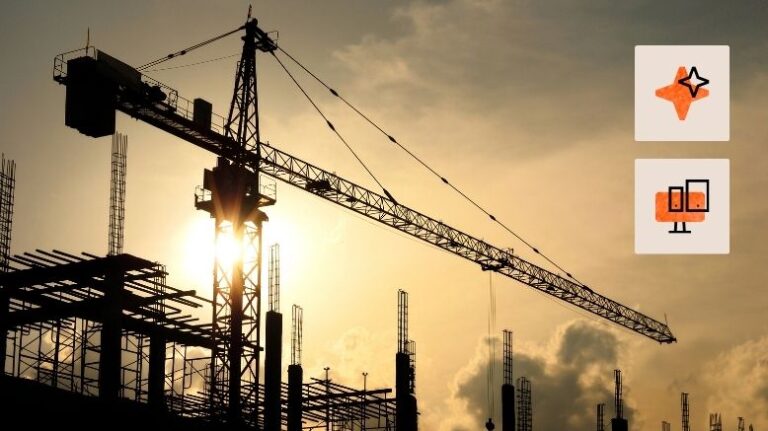— 4 min read
Future-Proofing Construction: AI, Data, and the Next Generation Workforce


Last Updated Oct 22, 2025

Akhil Gupta
Co-Founder
Akhil Gupta is the co-founder and CTO of Fresco AI. After spending many hours sitting with field teams, he found their tools to be clunky. He and his co-founder built the earliest versions of Fresco AI with direct input from those field teams. Akhil holds BA and MA degrees from Johns Hopkins University, and worked with the earliest Large Language Models (LLMs) at MIT and various startups.

Marlissa Collier
34 articles
Marlissa Collier is a journalist whose work focuses on the intersections of business, technology, policy and culture. Her work has been featured in digital and print formats with publications such as the Dallas Weekly, XO Necole, NBCU Comcast, the Dallas Nomad, CNBC, Word in Black and Dallas Free Press. Marlissa holds an undergraduate degree in Construction Engineering from California State University, Long Beach and an MBA from Southern Methodist University’s Cox School of Business.
Last Updated Oct 22, 2025

For decades, the construction industry’s technology adoption lagged behind other sectors, undeniably constrained by the realities of a field-based workforce and the complexity of building itself. But with the emergence of artificial intelligence (AI) co-pilots, construction leaders now have a path to not only catch up, but leap ahead.
Competition is fierce, margins are thin, and knowledge gaps are widening as experienced professionals retire. At the same time, a new generation of workers is entering the industry with expectations shaped by digital tools in every other aspect of their lives. Future-proofing construction will require bridging these dynamics — and AI may be the bridge.
Construction is zero-sum. If your competitor uses AI to be even 5% more efficient, they win the bid.

Akhil Gupta
Co-Founder
Fresco
Table of contents
From Reactive to Predictive
Today, most construction technology is reactive. Project managers use software to track progress, log changes and resolve issues after they occur. The future of AI promises something more: predictive and proactive insight.
Imagine an AI system that recognizes a parade scheduled to close a key street next week, automatically identifies which subcontractors and activities will be affected, and alerts the team before disruptions occur. What might take an experienced project manager three hours of cross-referencing maps, schedules, and documents, AI can now deliver in under 30 seconds.
In five years, AI won’t just answer your questions — it will tell you what to pay attention to before you ask.
Akhil Gupta
Co-Founder
Fresco
Data as a Competitive Asset
As AI becomes more powerful, the role of data grows more sensitive. Construction firms sit on decades of records that hold immense strategic value: what helped win bids, which schedules worked, how to avoid delays. Sharing that data with general-purpose AI models raises the risk of competitors gaining access.
Your employees are already using AI. The only question is whether you’ll give them secure tools that protect your data.
Akhil Gupta
Co-Founder
Fresco
This is why data security has become a cornerstone of AI adoption in construction. Fresco, for example, has pursued SOC 2 compliance and strict data segmentation to make sure each client’s information remains siloed. For firms that compete head-to-head on bids, the ability to leverage AI without compromising proprietary knowledge is non-negotiable.
Preserving Institutional Knowledge
Another looming challenge is the retirement wave. Many superintendents and project managers carry 20 to 30 years of hard-won experience — experience that risks walking out the door. AI offers a way to capture and democratize that expertise.
With co-pilot tools, the insights of a veteran can be encoded into systems that help a second-year project manager make better decisions. Instead of losing decades of institutional wisdom, firms can pass it forward. This doesn’t diminish human judgment — it amplifies it, giving younger professionals the same decision-making context as their mentors.
Attracting the Next Generation
Beyond efficiency, AI adoption has cultural implications. Recruiting young people into construction has been a persistent challenge. But the generation entering the workforce today is not only comfortable with digital tools — they expect them.
Young people want to join industries that embrace innovation — AI is part of making construction attractive again.
Akhil Gupta
Co-Founder
Fresco
By integrating modern technology, firms can position construction as a forward-looking field, not a legacy industry resistant to change.
Adoption Without Disruption
The key to unlocking the benefits of AI lies in usability. AI tools must meet workers where they are — on the jobsite, in the trailer or on their phones. Fresco AI has embraced this principle by designing interfaces that mimic familiar systems, from text messaging to chat-based browsers. Even workers with decades of experience can use them instantly, without training.
This human-centered approach eases adoption and allows technology to empower rather than overwhelm. For firms already struggling with labor shortages and heavy workloads, this balance is essential.
Free AI in Construction Course with Hugh Seaton
Start learning today with industry expert Hugh Seaton and discover how AI can boost efficiency, reduce risk, and transform your projects.

Preparing for the Future
"Shadow AI" — the unauthorized use of consumer AI tools on company devices — has already proven that employees are eager for AI, even if leadership hasn’t approved it. The path forward is not to ban these tools but to provide secure, industry-specific alternatives that protect data and align with business goals.
The construction industry has always thrived on adaptability, from shifting project delivery methods to integrating new building techniques. The next adaptation will be digital. Firms that begin adopting AI today will gain the learning curve, cultural readiness, and data-driven advantage to compete tomorrow.
In five years, AI co-pilots will not only answer questions: They will anticipate them. They will capture institutional knowledge, protect proprietary insights, and make construction a more attractive career for the next generation. The question is not if this transformation will happen — it’s who will lead it.
Was this article helpful?
Thank you for your submission.
0%
0%
You voted that this article was . Was this a mistake? If so, change your vote
Scroll less, learn more about construction.
Subscribe to The Blueprint, Procore’s construction newsletter, to get content from industry experts delivered straight to your inbox.
By clicking this button, you agree to our Privacy Notice and Terms of Service.
Thank you!
You’re signed up to receive The Blueprint newsletter from Procore. You can unsubscribe at any time.
Categories:
Written by

Akhil Gupta
Co-Founder | Fresco
Akhil Gupta is the co-founder and CTO of Fresco AI. After spending many hours sitting with field teams, he found their tools to be clunky. He and his co-founder built the earliest versions of Fresco AI with direct input from those field teams. Akhil holds BA and MA degrees from Johns Hopkins University, and worked with the earliest Large Language Models (LLMs) at MIT and various startups.
View profile
Marlissa Collier
34 articles
Marlissa Collier is a journalist whose work focuses on the intersections of business, technology, policy and culture. Her work has been featured in digital and print formats with publications such as the Dallas Weekly, XO Necole, NBCU Comcast, the Dallas Nomad, CNBC, Word in Black and Dallas Free Press. Marlissa holds an undergraduate degree in Construction Engineering from California State University, Long Beach and an MBA from Southern Methodist University’s Cox School of Business.
View profileExplore more helpful resources

Preconstruction Precepts: 7 Keys to Winning Jobs and Delivering Profit
Preconstruction sets the stage for everything that follows. A fully justifiable, error-free estimate projects confidence, wins bids, and assures the profitability of the final project. However, estimates and budgets are,...

6 Tips to Turn Construction Culture Into Daily Practice
Every construction company has a culture. Whether it’s intentional or not. The difference lies in how that culture shows up on the job. In the first article of this series on...

Turning Values into Workflows: How a GC Firm Operationalized Culture
Culture isn’t just about what companies believe — it’s about how those beliefs show up in day-to-day work. When culture is embedded into operations, it becomes something teams can rely...

How a Successful GC Firm Turned Personalities into Culture
The culture at Ryan Gootee General Contractors (RGGC), a successful construction firm based in New Orleans, was never something the company had to invent. It was always there. Woven into...
Free Tools
Calculators
Use our calculators to estimate the cost of construction materials for your next project.
Templates
Find a template to help you with your construction project tasks.
Material Price Tracker
Get the latest U.S. retail prices and view historical trends for common building materials.
Glossary
Explore key terms and phrases used in the industry.
